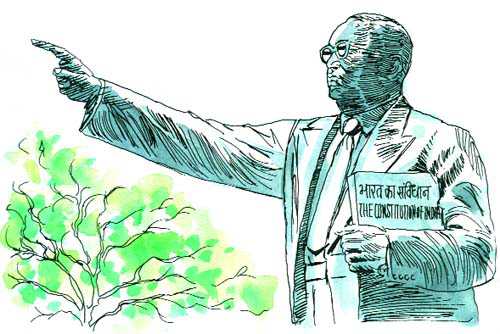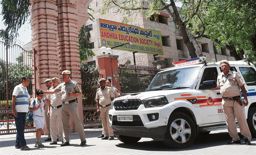
Illustrations: Sandeep Joshi
Harish Khare
LAST Sunday, I was invited to give what was billed as “the inaugural address” at Karnal’s Dyal Singh College national seminar on “Understanding Bharat Ratna Dr BR Ambedkar.”
In this case, it was particularly gratifying to meet and share the honours with Professor Ranbir Singh, one of the seniormost teachers in the region. More than a teacher, it was evident, he is held in high esteem as a veritable guru.
Dyal Singh College has sisterly links with The Tribune. It is also run by a Trust that was established by a will of Sardar Dyal Singh Majithia, the visionary who set up this newspaper.
The invitation from Dyal Singh College goaded me to brush up my knowledge of Ambedkar. Talking about Babasaheb has now become a somewhat hazardous proposition. With changing notions of political correctness, no one can be sure when someone will take offence and on what.
My own argument at the seminar was simple: “The scholar must rescue Ambedkar from the politician.” Ambedkar was not just a Dalit leader. Nor, was he just “the father of the Indian Constitution.” He was an intellectual giant who questioned the orthodoxies of the day.
In the course of brushing up on Ambedkar, I came across a brilliant article by Arundhati Roy, no mean dissenter herself. In the introductory essay, “The Doctor and the Saint,” to the book that republished Ambedkar’s most disturbing and daring thesis, Annihilation of Caste, she has written:
“History has been unkind to Ambedkar. First it contained him, and then it glorified him. It has made him India’s Leader of the Untouchables, the King of Ghetto. It has hidden away his writings. It has stripped away the radical intellect and the searing insolence."
In the context of the current turmoil, Ambedkar’s views on majority-minority equations are most apt. He has formulated his views in the context of the pre-Partition turmoil. He was at pains to make the point that if the Muslims and other minorities had to be kept under one tent, it was incumbent upon the majority (the Hindus) to make the minorities feel wanted, comfortable and unthreatened.
“...this whole question of minority representation is really the crux of the situation, and if the majority community desires that all minorities should associate with them in having or in claiming, a constitution which will give India what they call Dominion Status, or what we prefer to call Government by the people, for the people and in the name of the people, then I am afraid that the majority community must see to it that all fears of the minorities are set at rest. Otherwise it may not be possible for us to take what I do not conceal from myself is the risk that most of us are taking in claiming Dominion Status.”
This is perennial wisdom. Relevant then, relevant now.
But it is Ambedkar the intellectual that is the man for our times. I am sure he would have approved of much of what has happened in JNU. He would have heartily cheered Kanhaiya’s post-release speech. Ambedkar would not have allowed anyone to shout him down nor would he have put Kanhaiya in jail. His preferred mode of settling the point would have been to take on the other point of view in a fierce robust dialogue, just as he had once engaged Gandhi.
NORMALLY, I do not like to talk about hard-core political issues in this space, but the transfer of 'Adviser' Vijay Dev out of Chandigarh is too serious a matter to be left untouched. The transfer was sudden, abrupt and baffling. Admitted, no one is indispensable. Also, Chandigarh Advisers do tend to annoy too many people and, therefore, tend to get the marching orders.
However, Dev’s case appears to be in a class by itself. It is not every day that a bureaucrat’s transfer becomes a subject matter of public resentment. Chandigarh, of course, can boast of a very engaged citizenry and its residents care about the city as also about who is taking care of their city. But the breakout of public support for the ousted Adviser should be a matter of satisfaction to any bureaucrat. A very gratifying episode of civic engagement.
The other side of the Vijay Dev ouster is no less revealing. This side is less savoury. It is the story of political sordidness. The politician’s ugly impulses prevailed. All small political minds seem to have conspired in this shabby treatment of an efficient and conscientious officer. The city’s BJP crowd felt crowded out of public space by an activist Adviser. The Governor, who should have ‘protected’ the Adviser, found his own low political level. And, a vastly underequipped Union Home Minister lent his ear to his party people from the Union Territory.
The larger theme at work in this vastly un-redeeming affair is that given a bit of political elbow room, the BJP — like the Congress — too is happy to play host to unethical and corrupt interests. So much for the new renaissance!
ANYONE wanting to make sense of that baffling, confusing and exasperating phenomenon called American presidential politics should read David Axelrod’s Believer — My Forty Years in Politics. This book was published last year and is now available in India. Axelrod was Barack Obama’s principal campaign strategist, beginning with his 2004 US Senate campaign, then the 2008 presidential bid and again he quarterbacked the Obama forces in the 2012 re-election year.
Axelrod represents that unique breed — ‘political consultants’ — that is so central to understanding the passions and prejudices driving American politics. They are kind of intellectual mercenaries. Simply put, guns for hire, they lend their time and talent to this or that candidate for this or that office.
The American political system is wonderfully free of the tyranny of the party ‘mandate’ or ‘nomination.’ Anyone is free to challenge anyone for any office — the city halls, the state assemblies, the House of Representatives (436 contests every two years) and the Senate (37 contests every other year). Each contest means first a fight within the party. The American system would not countenance someone like Arun Jaitley or Manmohan Singh or Anand Sharma or Jairam Ramesh or Sitaram Yechury. No entry without direct election, no membership courtesy the ‘high command.’ But then, the openness of that system would have permitted each one of them to fight the battle, without seeking the nod or approval of the party establishment.
So, there are hundreds and hundreds of ‘political consultants’ helping thousands of candidates for numerous offices. Political consultancy is a big professional constituency. They think, strategise, invent slogans, improvise smear tactics, and advise what the candidates should say and when, which slice of voters to appease, etc. They provide the talent, experience, skills, insight and inspiration to back a candidate’s ambition and drive.
The relationship is not purely transactional. It works well when there is also a meeting of the minds. Before he agreed to help Obama get elected to the US Senate, Axelrod had to feel excited and motivated about the man.
“Barack personified the kind of politics, and politician I believed in. He seemed motivated by a fundamental conviction, born of his own experience that, in America, everyone who’s willing to work for it should get a chance to succeed. He was principled enough to stand alone when necessary, but pragmatic enough to make deals and get things done.”
Axelrod came to occupy the position of a veritable guru in Obama’s presidential campaigns. His importance was in the role he played — that of an adviser who can tell the man who wants to be the president of the United States to behave, to play to the agreed upon tone, to maintain the discipline of campaign strategy. Behind every successful American political career is a shrewd consultant like David Axelrod.
Though these days the rest of the world finds it somewhat revolting that a man called Donald Trump should be leading the Republican pack, Axelrod’s book brings out what it takes to run a presidential campaign. A presidential quest is a very demanding, at times, demeaning journey. It is a passionate affair, a sustained enterprise. A candidate’s willingness to go through a long grind, an unrelenting schedule, the constant and unsparing scrutiny from a partisan and hostile media all steel him or her to become a different and better politician. Axelrod brings out vividly the toll an American campaign takes on the presidential candidate, his (or her) family, morals and manners. This book, Believer, is a must read in this American presidential season.
WHEN was it last that newspapers wrote about the passing away of a bookseller? It happened a few days back when Lucknow’s iconic bookseller, Ram Advani, took the ‘big leave’ at the ripe age of 95.
The ‘Ram Advani Book-Sellers’ at Hazratganj was perhaps the only saving grace in a city that otherwise had been taken over by the philistine. Long before the Yadavs and the Mayawatis descended on the city, this seat of Avadhi culture had turned its back on anything arts, anything that could be vaguely called ‘intellectual.’ Long ago, it had found its comfort level in the sub-basement of collective mediocrity.
And it was in this ambience of art tone-deafness that Ram Advani held court at his bookstore. He would engage, converse and offer suggestions about books to anyone who strayed into his eclectic domain.
Alas, Chandigarh is not yet able to boast of a Ram Advani of its own.
Enough, time for coffee.


























